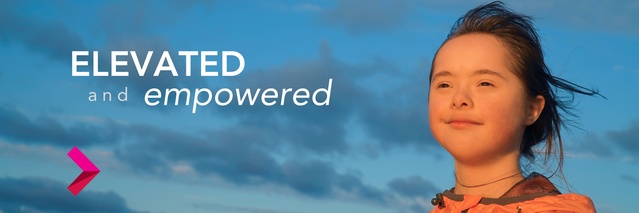
2022 brought a renewed focus to Disability Rights Ohio, as a new mission and vision were adopted to better guide and inform the organization’s advocacy. With a sweeping new set of values created to best represent who we are and what we stand for, the organization is poised to be more effective and more impactful in addressing the needs of Ohioans with disabilities.
This Our new vision - VOICES ELEVATED. PEOPLE EMPOWERED. EQUITY ACHIEVED - is the foundation on which our future is built and the common thread that unites all the work and advocacy that makes up our story.
We’re proud to share with you all we accomplished last year, as our team tirelessly works to elevate and empower those we serve.
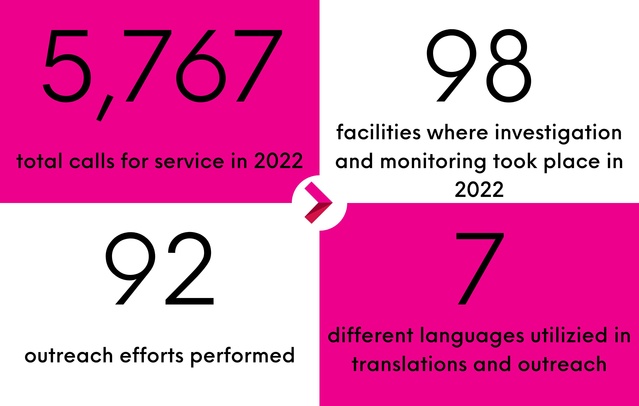
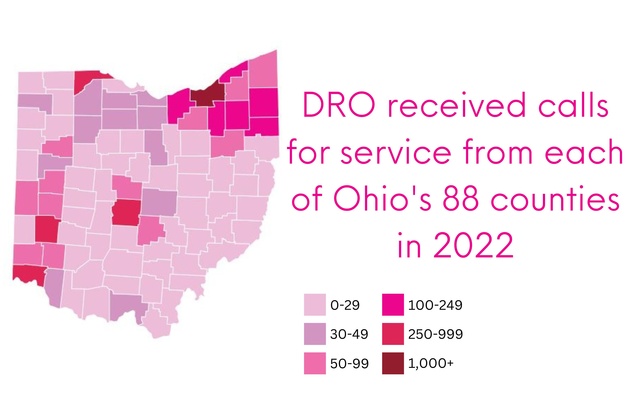
ANSWERING THE CALL: Intake and Short Term Assistance
NAVIGATING EDUCATION SUPPORTS: Education and Employment
REACHING INTO OUR COMMUNITIES: Outreach and Engagement
A WEALTH OF EXPERIENCE: Celebrating a Lasting Legacy
PROTECTING AGAINST ABUSE, NEGLECT, and EXPLOITATION
NOTHING ABOUT US WITHOUT US: Policy and Community Engagement
LIVING, WORKING, AND GOING WHERE YOU CHOOSE: Home and Community Based Services
MOVING FORWARD: A Message from our Executive Director
GUIDING OUR WORK: Our Board of Directors
FINANCIALS: Our Grantors and Supporters

Our Intake and Short Term assistance teams are the front door of our agency, and the successful outcomes we celebrate are often traced back to the care and diligence shown when calls are first answered.
This group strives to provide everyone who calls with information, advice, referrals, and options to handle the issue they contact us about even if we are unable to provide them with direct legal representation.
“We are proud of helping numerous people with disabilities get needed accommodations so they could continue to live in the community.” –Ginger Wilson, Short Term Assistance Team Leader
In addition to answering the call, these teams continued to promote supported decision making in partnership with a network of other organizations, empowering people with disabilities to make important decisions about their lives. These tools allow people with disabilities to obtain equitable access to work, living, healthcare and the opportunity to direct their own lives.
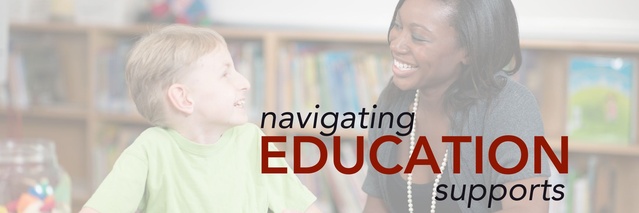
Intervening early in the life of a child with a disability with appropriate services and support can significantly improve that child’s outcomes. Our education/employment team works tirelessly to support students with disabilities from the time they enter the school system to their graduation from high school. Then, our employment team works to ensure that transition-aged students get the supports they need to go on to further education or competitive employment. This coordinated approach to advocacy helps to ensure that students with disabilities leave school with the skills they need to be as independent as possible and achieve their life goals.
Kristin Hildebrant, our Education/Employment Team leader, stated that two of her team's biggest achievements in 2022 were in addressing systemic complaints with the Ohio Department of Education, and pursuing the case of Hunter Garrett v. Opportunities for Ohioans with Disabilities (OOD).
In the Garrett case, DRO’s Employment Team enforced the right of a student named Hunter to services from OOD, Ohio’s vocational rehabilitation agency that are required by Title I of the Rehabilitation Act of 1973, which grants young people with disabilities individualized vocational rehabilitation services with the goal of helping them get a gainful job. OOD denied paying for a program at Hunter’s college that provided specialized supports for his disability, stating they do not cover these types of programs. The judge in the case agreed with Hunter and found that “the record clearly demonstrates how OOD repeatedly based its denial of support on arbitrary factors which were unrelated to what was vocationally necessary for Hunter.”
The conclusion of this case was a major win not just for Hunter, but for all college students with disabilities in Ohio. In the future, DRO and other advocates can point to this case as precedent that requires OOD to determine individualized vocational needs, and prevents OOD from denying services and supports using blanket policies against a particular type of program.
The Education team filed complaints with the Ohio Department of Education and the U.S. Department of Education, Office for Civil Rights alleging violations of federal special education law, systemic racism, and overuse of disciplinary techniques. One of the more complex complaints involved over 50 school districts that sent students to a regional segregated school program that failed to provide appropriate behavioral, mental health, and educational services to its students. That complaint resulted in corrective action plans for the school districts and the segregated school that require significant improvements to the education program and compensatory services for the individual students.
Our Education/Employment team will continue this advocacy so that students with disabilities have equitable access to an appropriate education and competitive employment.
“Advocating for students with disabilities by addressing the lack of behavioral supports, ensuring students have the services they need, and supporting parental advocacy and involvement in the IEP process means that more students will graduate with the skills necessary to lead productive lives.” –Kristin Hildebrant, Senior Attorney
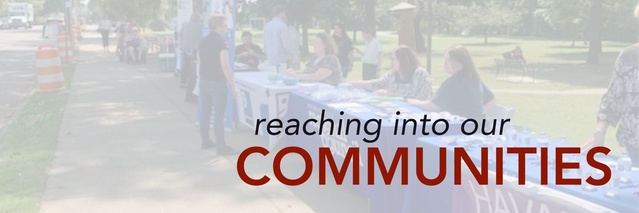
Our mission of elevating and empowering means meeting people where they are. Throughout 2022, we worked to reach directly into communities across Ohio to connect with those most in need of our resources and advocacy.
In Toledo we hosted an event geared directly towards Spanish-speaking families in the area, in the hopes of raising awareness of our vast library of resources.
“We can help ourselves from this type of information,” event attendee Mercedes Aguirre told WTOL-TV. “So that we can look ahead. Motivating them. Supporting them. Encouraging them, so they can be better off in their future.”
In another corner of the state, we partnered with several service organizations and employers to host the first-ever Southeast Ohio Job and Disability Resource Fair. On a sunny September day dozens of tables lined the sidewalks of Marietta, connecting people from both Ohio and West Virginia with employment opportunities and information on services that are available to them.
In a state as large and diverse as Ohio, this type of outreach is essential. Connecting directly with our communities – where they are and in their language – is the only way to elevate and empower all Ohioans with disabilities.
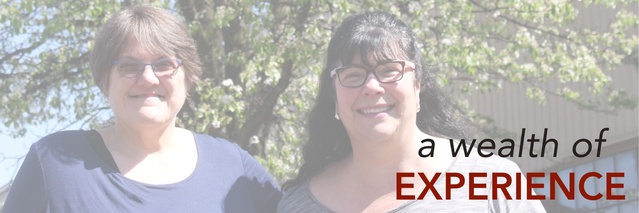
The work done by our team day in and day out requires an incredible amount of experience, expertise, and emotional investment. Our successes are often only possible because of the experience and tenacity of our team members.
Ginger Wilson – DRO Short Term Assistance Team Leader – started as a clerk at DRO in 1986. After several years spent working in the Ohio Attorney General’s office and then time spent at home raising her two children – who both have disabilities – Ginger returned to DRO in 2003 and has spent another 20 years investing her passion and expertise into our advocacy for equity.
“It’s great to work with people who inherently understand and genuinely recognize that people with disabilities are just people who happen to have a disability,” Ginger explains. "That may sound strange, but it is not something you always see in other workplaces and it’s nice to be around and work with people who have the same values and mission to empower people with disabilities.” -Ginger Wilson, Short Term Assistance Team Leader
Similarly, DRO Senior Attorney Kristin Hildebrant started as a law clerk in 1988 and has spent more than 35 years shaping and advancing our advocacy across the state. Kristin oversees DRO’s education work, helping to ensure that students and families have access to the information, resources, and advocacy necessary to receive the free and appropriate public education to which they are entitled.
“I love the work and the people at DRO. The work is meaningful and we get a lot of great outcomes in the area of education. We can intervene early in a child’s life and change their life course.” -Kristin Hildebrant, Senior Attorney
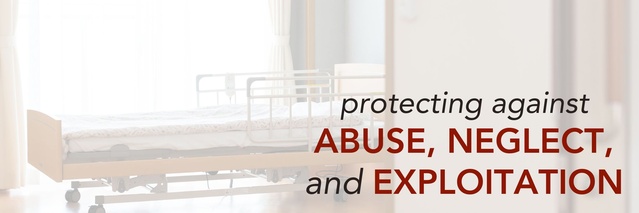
Empowering disabled Ohioans to fight back against Abuse, Neglect and Exploitation may be our heaviest task at DRO. Throughout this work, our Abuse and Neglect team (“A&N”) and Rep Payee team work collaboratively to protect disabled Ohioans. These two teams see some of the worst practices in action and provide a critical role in the balance of care in our state.
Kara Myers, who leads our Representative Payee team, is most proud of the way her team came out of the pandemic. The work this team does is crucial to ensuring that disabled Ohioans have all the financial freedom that others have, and that they are not being manipulated or wronged out of that financial success.
“We have been able to return to completing reviews in person which has helped the team reach more individuals and be more present to beneficiaries and issues with Rep Payees.” -Kara Myers, SSA Grants Team Leader
Our Abuse and Neglect team, led by Amy Price, works to cultivate a safe, inclusive, growth-promoting environment for advocates and disabled Ohioans.
The A&N team was most proud of their work this year in relation to youth residential treatment centers. This team has put an important emphasis on youth living in institutional settings (residential treatment facilities, foster care, detention centers, hospitals) where they may end up months to years behind their peers in terms of readiness and life skills.
“While we focus our work on rights education and protection, we are addressing the ongoing needs for trauma-informed care and environments, gender-affirming care, and decreasing the reliance on institutional based-care for all youth.” - Amy Price, Associate Advocacy Director
The A & N team also had an amazing 2022 with public outreach. For the first time, DRO conducted targeted outreach to gather input from individuals in state operated facilities and received 231 surveys back from disabled Ohioans in State Developmental Centers and State Regional Psychiatric Hospitals. This information was then used to inform planning for our goals for the current year, and help us highlight our new mission, vision and values.
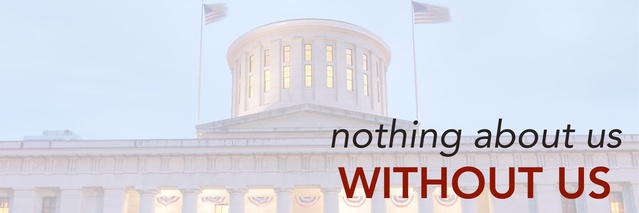
While we are focused on our work achievements from the past year, the phrase "Nothing About Us Without Us" will ring true forever. As an organization that advocates for disabled Ohioans, is staffed by many disabled Ohioans, and is invested in the needs of disabled Ohioans - we will never falter from this cry.
2022 gave us more to be grateful for in terms of our policy involvement. You may recall last year’s annual report, highlighting the role of our new Community Engagement Coordinator, Alexia Kemerling. This year’s report shares the fruit of this role, including some of the biggest successes. Throughout 2022, Alexia crafted meaningful relationships with SILOs (State Independent Living Organizations), Coalitions, and other advocacy groups to bring our mission of an equitable Ohio to life. Alexia was responsible for crafting multiple engaging campaigns, relationships and workshops for our community here in Ohio.
One example of this outreach was in the congressional meetings held with the Ohio Olmstead Taskforce for their Advocacy Day, and then again with SILOs throughout our state. Altogether, there were over 5 events tailored to congressional outreach. These events helped to connect people directly to their legislative offices in their specific region and at the Statehouse to better set the foundation for meaningful conversations between our advocates and the people who represent them.
DRO’s new vision - Voices Elevated. People Empowered. Equity Achieved - is the heartbeat of the Policy team.
“Every day we elevate disabled voices through our direct care workforce project and empower advocates to engage with their legislators and policymakers. The combination of these two principles works to ensure equitable solutions are achievable.” -Jordan Ballinger, Policy Director
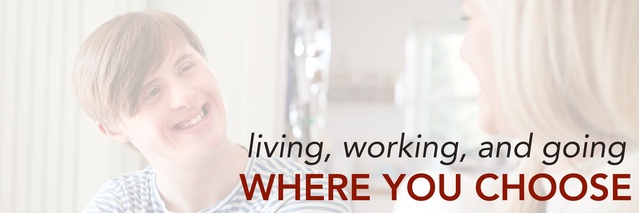
The fight for disability justice will never stop as long as systemic barriers exist to combat the community work that we uplift every day. Disabled Ohioans have been here fighting for themselves long before there was a “Disability Rights Ohio”, and we are committed to empowering those voices through our advocacy. Disabled Ohioans should be able to live where they want, work where they want with a dignified wage, and receive the care that they need.
This year, one of our largest priorities was in the Direct Care Workforce Crisis, including our story-telling series #EveryoneDeservesCare. This project has taken us all around the state to hear the stories of over 20 advocates - and counting - whose lives have been affected by this crisis. While we continue to fight along with our community for higher wages for direct care workers, we are happy to say that we have seen a massive change in the public understanding of this crisis - due in small part to this campaign.
"The direct care workforce crisis impacts so many people across Ohio - those suffering without the care they need, those pushed into institutions because they have no reliable personal care aide or home health aide or nurse, and the workers themselves who do such important work but are paid low wages and given little or no benefits." - Kevin Truitt, Legal Advocacy Director
Our Civil Rights and Integration (CR&I) is also deeply focused on this work. Chris Camboni, CR&I team leader, expressed pride in his team from 2022 with the continued investigation into the Cuyahoga County Juvenile Detention Center (“CCJDC”). The CR&I team along with the A&N team visited CCJDC two times in 2022 and met with kids living there to investigate the facility. The CR&I and A&N teams have not only created a substantial change for the youth at CCJDC through this investigation, but will set the standard for treatment in various other youth centers.
“Society consistently fails these kids by subjecting them to, among other things, inadequate behavioral and educational supports, neglect by Children Services and other governmental agencies, unjust legal outcomes, and abuse by facility staff,” Chris states.
In addition to the CCJDC investigation, one of the most massive systemic projects the CR&I team undertakes is at the intersection of race and disability.
“This discrimination—which is based on ignorance, as well as implicit and explicit biases—leads to staggeringly disproportionate incarceration rates of people with disabilities and people of color. As a result, those populations have suffered pervasive injustice and inequity, including systematic practices that lead to imprisonment," -Chris Camboni, Civil Rights and Integration Team Leader
Through the work of projects like the Columbus Safety Collective and through our continued work in advocating for alternatives to law enforcement for behavioral health crises, appropriate discipline practices in schools, and better care in behavioral centers, the CR&I team pushes against this discrimination head first every day.
In total, the CCJDC investigation, fighting racial justice, and the work we have done with the direct care workforce crisis are all a part of our value of Justice and Dignity - making sure that people with disabilities are free from harm, prejudice and discrimination.
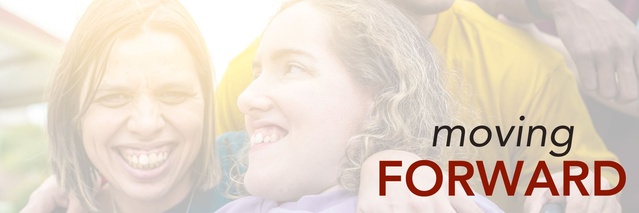
Transformative work often happens in incremental moments, and I couldn’t be more proud of the steps our team has taken over the last year to identify our organizational values and clarify our shared vision of the society we’re trying to build. Informed and inspired by a new mission, new vision, and new values, our work will move forward with the focus and forethought necessary to successfully advocate.
As we move into this new year of work – backed by this clear, shared concept of who we are and what we’re working to achieve – our commitment remains clear. By continuing to reflect on our strategic direction and making data-informed decisions, the potential to effect real change in the communities we serve is great.
While complex in practice, our motivation is simple: Advocating for an equitable Ohio for people with disabilities. We hope that you’ll join us in making a greater and more meaningful impact across our state. The more people who join us in amplifying our advocacy and supporting our work, the sooner our ultimate vision will come into focus.
-Kerstin Sjoberg, Executive Director
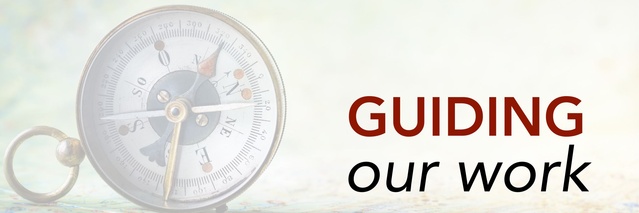
Leading, guiding, and informing an organization with a mission as broad and impactful as ours requires unique lived experiences and a focus on advocacy. Our Board of Directors is unique in that each of its 15 members has life experience as a person with a disability, as the relative of someone with a disability, or as a professional in the disability space. This perspective informs and shapes our strategic vision and guides every initiative we take. In facing each challenge that comes along with leading a non-profit organization like ours, each board member’s unique story and background helps ensure that the core of our mission – advocating for the rights of Ohioans with disabilities – never slips from view.
Our Board of Directors:
· Bill Bauer, President
· Susan Koller, Vice President
· Jennilee Mohler, Secretary
· Jordy Stringer, Treasurer
· Kristina Kapp, PAIMI Advisory Council Chair
· Tia Braun
· Cecilia Hardy*
· Douglas Kidd
· Mykal Leslie
· Matt O’Nesti
· Ron Patton
· Jeffrey Pollock
· Norma Ramos-Prater
· Amelia Whorton
· TyKiah Wright
*Law Student Fellow / Non-voting Member

We receive support from core federal grants that provide the basic foundation or our work as the protection and advocacy system. We also strategically partner with federal and state agencies, private foundations and individual donors to build long-term stability and provide additional programs and services that advance our mission. We also are honored to have many individual donors all across Ohio who invest in the expansion of our work. If you are interested in supporting our advocacy, please visit disabilityrightsohio.org/donate.
CORE FEDERAL GRANTS
- Protection and Advocacy for Individuals with Developmental Disabilities (PADD)
- Protection and Advocacy for Individuals with Mental Illness (PAIMI)
- Client Assistance Program (CAP)
- Protection and Advocacy for Individual Rights (PAIR)
- Protection and Advocacy for Assistive Technology (PAAT)
- Protection and Advocacy under the Help America Vote Act (PAVA)
- Protection and Advocacy for Individuals with Traumatic Brain Injury (PATBI)
- Protection and Advocacy for Beneficiaries of Social Security (PABSS)
- Work Incentives Planning and Assistance Program (WIPA)
- Protection and Advocacy for Beneficiaries with Representative Payees (PABRP)
OTHER RESOURCES
- Ingram-White Castle Special Education Fellowship
- The Columbus Foundation
- The Ohio State Bar Foundation
- The Ohio Access to Justice Grant
- Ohio Developmental Disabilities Council
- Ohio Statewide Independent Living Council
Our Spending:
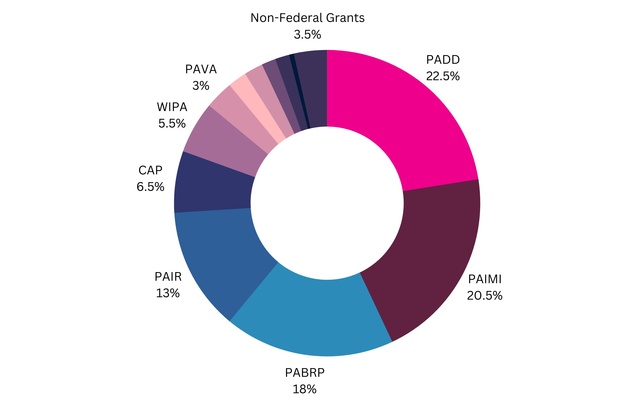
Disability Rights Ohio is authorized by federal law to protect the human, legal, and civil rights of people with disabilities in Ohio.
DRO and this publication are made possible through funds received from federal programs.
For a complete list of programs, visit: https://www.disabilityrightsohio.org/programs
The contents of this publication are solely the responsibility of Disability Rights Ohio and do not reflect the official views of the entities listed above and you should not assume Federal Government endorsement. This publication is printed, published, or produced and disseminated at U.S. taxpayer expense.

